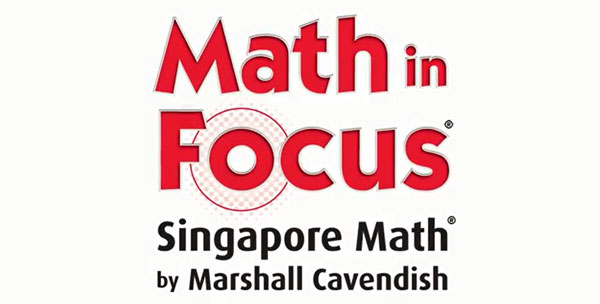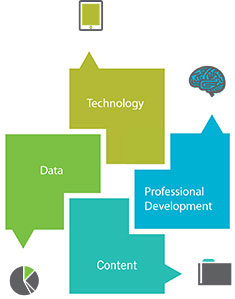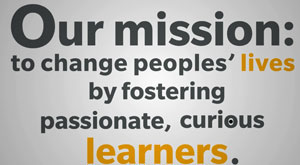| |
Using Data-Driven Decision Making to Transform Teaching and Learning
Building the capacity of teachers to adopt a systematic process for using school-wide is the key, Author Sharnell Jackson explains:

Using formative school-wide assessment data to transform the teaching and learning process requires teachers to become data literate and the adoption of a systematic process for using data to provide evidence for instructional planning to meet the individual learning needs of students.
The benefits of data-driven decision making are:
- Sharing effective practices
- Using assessment for learning in planning instruction
- Identifying learning gaps
- Facilitating student goal-setting
- Engaging teacher dialogue focused on a data-driven inquiry process that personalizes student learning needs
Teachers should consider adopting a systematic process for using school-wide formative assessment data that is frequently and systematically collected. It provides evidence to inform next instructional steps and improves their ability to identify student-learning needs and effectiveness of interventions.
Good teachers are constantly assessing student learning in both formal and informal ways, and all of this information can count as formative data. The idea of an inquiry cycle is important because using data to answer a specific question often leads to further questions. The three steps in the cycle are to:
- Collect and prepare a variety of data about how students’ are learning or not;
- Interpret the data and develop hypotheses about how to improve student learning; and
- Modify instruction to test those hypotheses.
A systematic data inquiry process begins and ends with a principal’s vision for school-wide data use to include:
- Establishing – school-wide professional learning
- Defining – critical teaching and learning concepts
- Developing – action plan goals which are attainable, measureable, and relevant
- Providing – guidance on using data to support the school vision
The reason I emphasize the need for a clear vision for school-wide formative assessment data use is because effective use of data depends on everyone in the school being involved with and supporting evidence-based decision making to improve instruction and student learning. Because teachers do not work in a vacuum, it is important to develop shared habits, vocabulary and expectations for data use. It is likely to be helpful for schools to adopt a written action plan that reflects the opinions and experiences of teachers and school leaders such as principals and curriculum coaches.
You should consider creating a data team with representatives from various groups to provide input into decisions and to serve as a liaison between staff and district leaders who are responsible for putting data systems in place.
And of course leadership is critical and can be shared among principals, coaches, and/or other members of the data team. Support for school-wide formative assessment data use is critical; these supports include human and financial resources as well as time.
A school-based facilitator should be available to help educators interpret and use data on a regular basis.
One of the concerns I often hear from teachers is a lack of time to review data both alone and in collaboration with colleagues. Time should be scheduled during the school day or after, and the schedule should be designed to facilitate the necessary types of collaboration such as grade-level or cross-grade teams.
On-demand blended professional learning focusing on school-wide formative assessment data use should be provided throughout the school year.
The biggest hurdle for teachers is not learning new approaches to teaching but implementing them. You can accelerate students learning needs by,
- Building the human capacity of teachers to use formative assessment data
- Adopting a sustainable data analysis framework, data driven tools, and
- Incorporating blended learning environments to enable students of all abilities to enjoy learning at their own pace, path, place, and time.
Data-driven decision making is not a passing fancy and is here to stay. Without data there is no evidence to inform instruction and meet every student-learning need.
Click here for information on data and assessment solutions.
About the Author:
Sharnell Jackson is the Founder/CEO of Data-Driven Innovations Consulting. Their mission is to provide recommendations and professional learning in order to create the organizational and technological conditions that foster the most effective systematic processes for using data. This action helps bring evidence to bear on instructional decisions that improve the ability of teachers to meet students' learning needs.
Product Spotlight

Math In Focus
Math in Focus is an authentic Singapore Math® curriculum—with problem solving as the center of math learning and concepts taught with a concrete–pictorial–abstract learning progression through real-world, hands-on experiences. Beyond the digital learning tools and apps that are native to the core program, Math in Focus® Digi+™ offers a complete online teaching and learning environment for Grade 1–5 students. Learn more.
Click here to see how Math in Focus is motivating students and changing math classrooms.
We want to hear from you!

Houghton Mifflin Harcourt is dedicated to offering regional events that are designed to bring together education leaders in the charter communities to foster in-depth dialogue coupled with presentations and collaborative workshops that offer strategies and tools to better serve your students and faculty.
Help us customize the 2016 events to meet your needs. We want to hear from you.
Take the survey!
Charter Performance Program
We know there is a story behind every student, teacher and parent, and each one has different needs and expectations for learning. That’s why we designed a solution that allows for individualized delivery models (online, blended, and traditional) to address all types of learning styles.
Whether you want to drive performance or develop an exceptional curriculum with research-driven content, HMH offers you the flexibility to adopt instructional products, data, professional development resources and technology in any combination to meet the unique needs of your education strategy. Ask HMH to tailor a proposal that best meets the unique needs of your school and students. |  |
Technology
Advanced technology, including digital content, assessment data, and evolving instructional methods, expands opportunities for personalized teaching and learning.
Data
Assessment and data management tools help educators monitor and support the achievement of every student.
Content
Address your school’s unique needs with an integrated curriculum that is both creative and effective.
Professional Development
Give your teachers the tools for success with on-site implementation training and ensure your program delivers optimal student results.
|
|
Professional Development Corner
From The Teacher Tip, A Free App from Heinemann.
Have Students Write To Communicate Solutions
Adapted from Modeling With Mathematics by Nancy Butler Wolf
 At the conclusion of the class period, ask students to summarize their work and explain their mathematical reasoning. Then, analyze their writing to determine solutions.
Here is an example of a specific Q&A analysis:
Do students use math to make sense of complex situations?
This student used appropriate mathematics to quantify the relationship between height and foot length. Then, he used math appropriately to find average, scale factor, and apply the result to estimate the height of the giant.
Can they formulate hypotheses?
This student formulated a hypothesis. He used some prior knowledge (“Oscar heard that people are 7 times taller than their foot size”) to predict the size of the giant.
Are they able to explain concepts?
This student does a fairly good job of explaining concepts used. He was able to explain the steps taken, although he did not necessarily use appropriate mathematical language.
Are they confident about using mathematical procedures?
This student appears to be confident in his reasoning and his solution. The only confusion expressed was, again, identifying exactly what he was doing when he divided height by foot length (and then multiplying the average by the Giant’s foot length). He was confident that it would work, but a little unclear about why!
This brief analysis of the written description helps clarify what the student understands and what he or she is still confused about. This information helps to inform further instruction.
Instead of relying solely on numerical solutions, asking students to write can identify areas of confusion that teachers may miss otherwise.
Wolf, Nancy Buter. 2015. Modeling With Mathematics: Authentic Problem Solving in Middle School.
|
Financial Resources to Help Your School Excel
Featured Grant - The Dr. Scholl Foundation Grant

The Dr. Scholl Foundation was established by William M. Scholl, M.D., in 1947. It is a private, independent grant-making foundation for charitable purposes. In general the Foundation guidelines are broad to give them flexibility in providing grants. Applications for grants are considered in the following areas: Education, Social Service, Healthcare, Civic and Cultural, and Environmental.
Average Amount: $5,000 – $25,000
Deadline to Apply: 3/1/16
Apply online here.
Find more grants with our Free Grant Database.
|
Upcoming Events
Visit HMH at these upcoming local events:
11/10–12: Florida Charter School Conference (FCSC), Orlando, FL
11/11–13: Missouri Charter Schools Conference, Kansas City, MO
11/12–13: Ohio Charter Schools Conference, Columbus, OH
11/16–17: California Charter Schools Leadership Conference, Burlingame, CA
11/16–18: South Carolina Public Charter School Conference (SCPCSC), Columbia, SC
12/6–8: Tennessee Reading Association Conference, Murfreesboro, TN
|
| |
|







